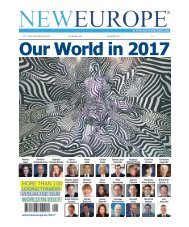Our World in 2018
Leading minds reflect on the state of our societies, and examine the challenges that lie ahead. An edition dedicated to generating ideas that will help form a new vision for our world.
Leading minds reflect on the state of our societies, and examine the challenges that lie ahead. An edition dedicated to generating ideas that will help form a new vision for our world.
You also want an ePaper? Increase the reach of your titles
YUMPU automatically turns print PDFs into web optimized ePapers that Google loves.
GLOBAL VS. LOCAL WORLDS
Venezuela’s Struggle for Freedom
By María Corina Machado
The wave of violent protests that swept
Venezuela this year focused global
attention on my country’s plight.
Millions of Venezuelans left the country,
and many more are trying to flee from
hunger, disease, and oppression. President
Nicolás Maduro, rather than seeking to end
his dictatorial rule, drawing worldwide
condemnation.
on the international community’s radar, few
have fully grasped why it is happening, or
what a slide into autocracy might mean
beyond the country’s borders. A regime
that has transformed a once-prosperous
country into a basket case of poverty and
crime is a threat not only to Venezuelans,
but also to decades of democratic progress
in the region.
Maduro’s despotism has been compared
to Raúl Castro’s hold on Cuba. But, rather
than a full-blown totalitarian regime, what
we have in Venezuela is, to borrow a term
from the German legal theorist Carl Schmitt,
a permanent “state of exception.” Using the
illusion of free elections as a smokescreen,
Maduro has sought to strip Venezuela’s
democracy of its substance by subordinating
all key institutions, especially the National
Electoral Council, to the government.
Amid this democratic ruse, the regime
kills, tortures, persecutes, and exiles
opponents, threatens and intimidates critics,
and censors or closes down media outlets,
slowly asphyxiating freedom. In relying on
piecemeal subjugation, the regime seems
intent on not crossing some invisible “red
line” that might force the international
community to take a tougher stand.
Sadly, at the moment, Maduro need
not worry. With the Cold War a distant
memory, the West’s threat-perception
mechanisms have weakened. Many Western
leaders struggle to grasp the dangers that
María Corina
Machado
María Corina
Machado is a former
member of the
National Assembly
of Venezuela,
and the founder
of Súmante, a
Caracas-based
election-monitoring
organization.
Maduro’s regime poses to the stability of
Latin American democracies, to the West’s
security in general, and to the national
interests of the United States in particular.
Aside from US President Donald Trump’s
refusal to rule out a military option, most
global commitments to Venezuela’s pro-
.
There are numerous reasons why
stronger international pressure is needed.
For starters, Maduro’s regime continues
to supply Cuba with Venezuelan oil and
money to shore up Castro’s dictatorship. No
prudent observer could welcome the longterm
implications of this partnership.
The Maduro regime also supports, and
forces, from radical parties and secessionist
groups in Spain, the United Kingdom, and
across Europe, to well-known terrorist
organizations in the Middle East, where it
cultivates strong connections with Iran and
radical Islamists (continuing the policies
of its predecessor). Moreover, Venezuela’s
government often supports anti-Western
diplomatic initiatives at the United Nations,
and stirs up division and strife within
regional bodies, like the Organization of
American States.
And lest we forget, the regime’s ties to
Colombian and Mexican drug cartels, money
documented.
During the confrontations with the
regime that took place throughout
Venezuela this year, unarmed, courageous,
and determined people directly challenged
Maduro’s security forces, demonstrating
that Venezuelans will resist attacks on their
.T
the young – have already made bear witness
to this commitment.
So, what happens next? Regime
change, a top priority for many, can still
be accomplished, but only with the right
tools. To topple the forces of illiberalism
150 2018 | OUR WORLD










